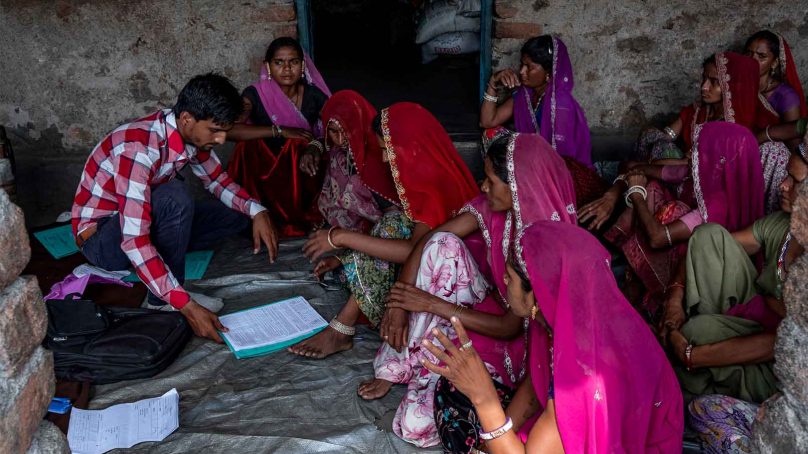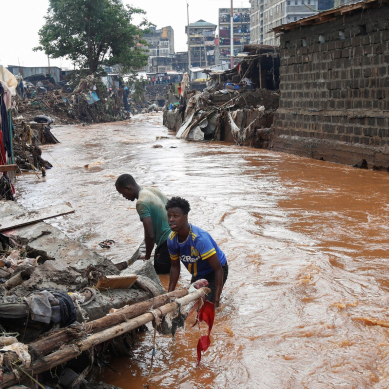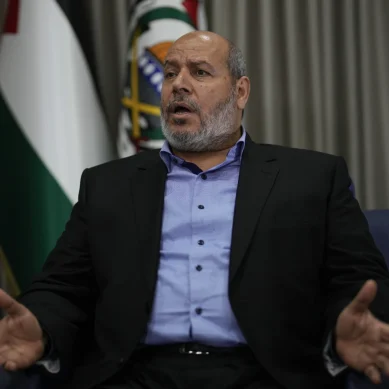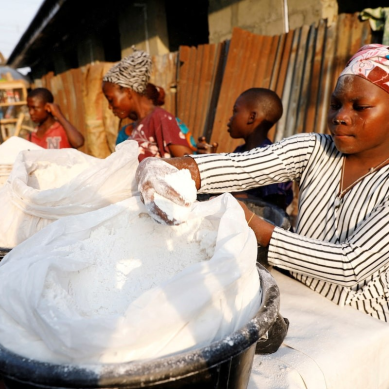
In several of the countries The New Humanitarian reported from – including among Adivasi Indigenous communities in southern Rajasthan, India – parents often view men who have migrated as favourable matches for their daughters.
Many Adivasi men go to work in the Indian state of Gujarat. “My father met my husband working in a factory,” Pushpa Devi told us in the village of Salkal. “He knew he was going to pay for the wedding from his own savings and that indicated that he was hardworking.”
“My father met my husband working in a factory,” Pushpa (standing) said.
Pushpa got married when she was 15, which is not unusual among the Adivasi. Early marriage often means that parents do not invest in their daughters’ education, which has life-long consequences. “I cannot help my oldest son with his homework anymore since I do not speak English, I do not know mathematics,” Pushpa said.
In San Luis Potosí, Mexico, however, anthropologist Nelly López said migration has contributed to a trend of women marrying later in life and continuing their education. “Families themselves tell [women] to wait to marry and study first,” López explained.
When they do marry, women in San Luis Potosí often choose partners who have migrated. “It is not only because of the economic situation,” López said. “If you marry somebody who was already in the US, it means he is able to cook, wash his clothes, and yes, he might have his own house too.”
One of the main reasons why the fathers we have spoken to during our reporting migrate is to secure a better future for their children. But women who remain behind say that taking on the responsibilities of parenthood alone is one of the most significant challenges they face.
Having to fulfil the roles of two parents has an impact on their relationship with their children, who also often struggle to adjust to their fathers being away.
In 2017, we met five-year-old Keyssy, for example, from the Istmo region in Oaxaca, Mexico. She was born when her father was already in the United States. He didn’t come back until she was three years old. In the meantime, Keyssy called her uncle “father”. When her actual father returned, it took Keyssy time to get used to him being home.
For Flor, when she put her daughter in childcare after her husband left, she started noticing a change in her behaviour. “Teachers told me she was more aggressive,” said Flor, who eventually decided to take her to a psychologist.
Many of the places we’ve reported from have extreme climates that are becoming harsher because of the effects of the climate crisis. Some of the women we met chose to try to adapt, often with help from local or international organisations. Others decided to migrate.
In Dega, in Tigray, we also met Tsega, a 45-year-old mother of four children. Like other women from the village, Tsega would walk four kilometres every day to collect water from the closest well. “Before my husband left, we had no land, no means to earn money,” Tsega said.
Since the 1980s, Dega has been hit by a worsening cycle of droughts that have upended people’s livelihoods. Like many other Ethiopians, Tsega’s husband migrated to Saudi Arabia in search of work around 2008. After not receiving money from her husband for a few months, and afraid that he had abandoned her, Tsega decided to go to Saudi Arabia to search for him and to earn money to support their children.
Leaving the children in the care of relatives, Tsega followed a well-beaten path of Ethiopian women who go to countries in the Gulf and the Middle East to find employment as domestic workers. She found her husband and was able to earn money to send to her children. But like other domestic workers in the region, she also faced exploitation and abuse.
In 2013, Tsega and her husband were deported back to Ethiopia and returned to Dega, where they continued to struggle to scrape together a subsistence amid the worsening effects of the climate crisis.
In the Sierra Norte region of Oaxaca, Mexico, where much of the local Mixe Indigenous population depends on coffee production for their livelihood, climate change brought a disease called coffee rust that destroyed the plants around the village of San Isidro Huayapám in 2015. As a result, many men from the region migrated in search of work.
“My eight sons were growing coffee, but after the rust they had to go,” 69-year-old Irene Jimenéz Almaraz recalled when we spoke in her living room in 2019.
Irene, 69, worked to cultivate coffee that would survive in Mexico’s changing climate. “My eight sons were growing coffee, but after the rust they had to go,” she said, referring to coffee rust disease that destroyed plants.
Instead of giving up on coffee cultivation, however, Irene was working to mitigate the effects of climate change. With the help of an NGO, she established a nursery and has been planting different varieties of coffee to test which ones can resist the rust. “Coffee needs a lot of care; the plots need to be cleared every two months. But I work, step by step, since coffee is all I have,” Irene said.
We saw this among the Adivasi in India, where women organised solidarity groups with the help of NGOs to fight back against corrupt officials syphoning off government rations meant for vulnerable families. We also witnessed it among Indigenous communities in Mexico where women whose husbands had migrated represented their families at community general assemblies – a role that had traditionally been reserved for men.
When men leave, space can open for women to be more active in the civic realm. Adivasi women in India organised to fight against corrupt officials syphoning off government rations meant for vulnerable families.
“We have to participate… Men are starting to take women into account. Before, they did not. But now women will even pick up the microphone and say something,” Juliana López, from El Fortín Alto in Oaxaca, told us. “We are realising that we are equal.”
Stories were collected by Magdalena and Noel Rojo within their documentary project Women Who Stay. In the past five years, they documented the lives of more than 70 women who stayed in India, Mexico, Ethiopia, Senegal, Romania, and Slovakia while their male counterparts migrated.
- The New Humanitarian report / By Magdalena and Noel Rojo











